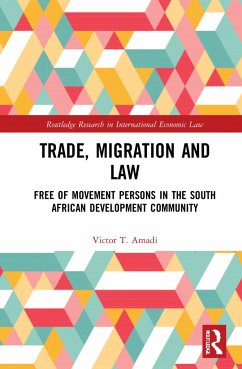This book explores how law and policy makers within the Southern African Development Community regional structure might reform the legal and regulatory frameworks to best capitalise the benefits of the movement of people, drawing lessons from other experienced jurisdictions by critically engaging with the regulatory efforts and approaches in regions such as the European Union, the Economic Community of West African States, and the East African Community to propose a revised approach to migration governance and practice in the SADC. Deeper regional integration allows citizens to move freely across national boundaries, and services are a rising component of global trade and investment. However, global trade in services is stifled by barriers at and behind the border. These barriers make it difficult for service providers from developing regions to access key markets in their preferred modes of service trade. Against this background, this book aims to take the discussion on furthering regional integration and trade through the movement of people by tackling issues on stringent immigration policies, arguing that having a vibrant and rewarding trade in services will require an approach towards the unrestricted movement of persons.
Bitte wählen Sie Ihr Anliegen aus.
Rechnungen
Retourenschein anfordern
Bestellstatus
Storno

